Related Research Articles
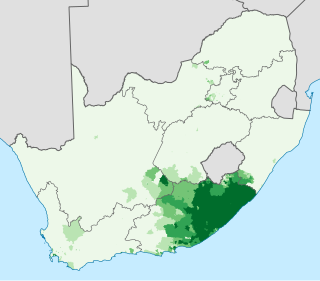
Xhosa, formerly spelled Xosa and also known by its local name isiXhosa, is a Nguni language and one of the official languages of South Africa and Zimbabwe. Xhosa is spoken as a first language by approximately 10 million people and as a second language by another 11 million, mostly in South Africa, particularly in Eastern Cape, Western Cape, Northern Cape and Gauteng, and also in parts of Zimbabwe and Lesotho. It has perhaps the heaviest functional load of click consonants in a Bantu language, with one count finding that 10% of basic vocabulary items contained a click.

The Eastern Cape is one of the provinces of South Africa. Its capital is Bhisho, but its two largest cities are East London and Gqeberha.
1990 in South Africa saw the official start of the process of ending Apartheid. President of South Africa, eid. President De Klerk unbanned organisations that were banned by the government including the African National Congress, the South African Communist Party and the Pan Africanist Congress. The African National Congress, Umkhonto we Sizwe, suspends its armed activity within South Africa. Political prisoners including Nelson Mandela were released. Nelson Mandela met ANC leader Oliver Tambo for the first time in 28 years at a meeting in Sweden. Mandela also traveled to England to thank the people for their support in the campaign to free him. South Africa withdrew its troops from Namibia, which was granted independence. 1990 also saw marches in support and against the formation of a new post-Apartheid South Africa.

Mount Frere, officially KwaBhaca, is a town located in the Eastern Cape province, previously known as the Transkei region, of South Africa. Its name in Xhosa is KwaBhaca, or "village of the Bhaca chiefdom", or "place of the Bhaca people", who settled here around the year 1825.
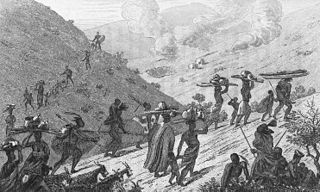
The amaMfengu was a reference of Xhosa clans whose ancestors were refugees that fled from the Mfecane in the early-mid 19th century to seek land and protection from the Xhosa. These refugees were assimilated into the Xhosa nation and were officially recognized by the then king, Hintsa. The term derives from the Xhosa verb "ukumfenguza" which means to wander about seeking service.
Kirkwood is a town in the Eastern Cape Province of South Africa. It is situated on the banks of the Sundays River in the eponymously named Sundays River Valley, which forms part of the Sundays River Valley Municipality in the Sarah Baartman District Municipality of the Eastern Cape.
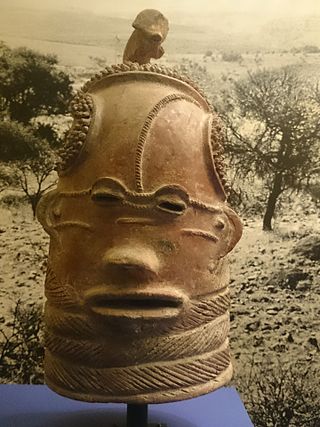
South African Bantu-speaking peoples are the majority of black South Africans. Occasionally grouped as Bantu, the term itself is derived from the word for "people" common to many of the Bantu languages. The Oxford Dictionary of South African English describes its contemporary usage in a racial context as "obsolescent and offensive" because of its strong association with white minority rule with their apartheid system. However, Bantu is used without pejorative connotations in other parts of Africa and is still used in South Africa as the group term for the language family.
Ngcobo, alternatively rendered Engcobo, is a town in the Eastern Cape province of South Africa.
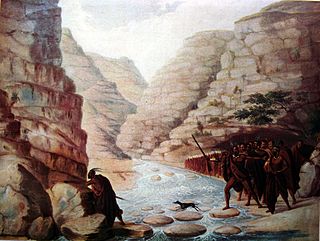
The Xhosa Wars were a series of nine wars between the Xhosa Kingdom and the British Empire as well as Trekboers in what is now the Eastern Cape in South Africa. These events were the longest-running military action in the history of European colonialism in Africa.

Butterworth, also known as Gcuwa, is a town in the Eastern Cape Province, South Africa. Butterworth has a population of 45,900 and is situated on the N2 national highway 111 km north of East London.
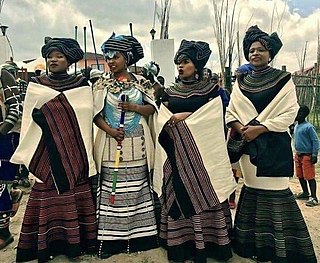
The Xhosa people, or Xhosa-speaking people are a Nguni ethnic group whose traditional homeland is primarily the Cape Provinces of South Africa. They are the second largest ethnic group in Southern Africa and are native speakers of the IsiXhosa language.

Delft is a township on the outskirts of Cape Town, South Africa. It is situated next to the Cape Town International Airport, Belhar, Blue Downs, Ikwezi Park, Mandalay,Luzuko, Phillipi East and Site C, Khayelitsha. It is known for its recreational events, youth empowerment organizations such as Enkosi Foundation and the community has establish a motherbody organisation, the Delft Community Development Forum. Delft is a community that consists of numerous government built housing projects such as the N2 Gateway. In 2022 Deft was the fastest growing community in Cape Town.
Centane, alternatively rendered Kentane or Kentani is a settlement in Amathole District Municipality in the Eastern Cape province of South Africa. It is situated at approximately 31 kilometres (19 mi) from Butterworth.

Jongumsobomvu Maqoma was a Xhosa chief and a commander of the Xhosa forces during the Cape Frontier Wars. Born in the Right Hand House of the Xhosa Kingdom, he was the older brother of Chief Mgolombane Sandile and nephew to King Hintsa. In 1818, he commanded the forces of his father, Ngqika, who seemingly was trying to overthrow the government and become the king of the Xhosa nation. In 1822, he moved to the so-called neutral zone to take land but was expelled by the British troops. and Chief Maqoma his Know Usenam Ningi
Emnyameni is a Xhosa community in Amahlathi Local Municipality within the Amathole District Municipality in the Eastern Cape province of South Africa, situated about 13 km north-west of Keiskammahoek. The community sits at the foot of the Mt Geju and Mt Belekumntana. It is made up of two villages, aptly named the Upper Emnyameni and the Lower Emnyameni.
Makazole Drex Mapimpi is a South African professional rugby union player for the South Africa national team and the Sharks in the United Rugby Championship. He usually plays as a winger and centre. He was part of the winning Springboks of the 2019 Rugby World Cup in Japan. He became the first South African to score a try in a World Cup Final.
In June 2018, England played a three-test series against South Africa as part of the 2018 mid-year rugby union tests. The series was part of the sixth year of the global rugby calendar established by World Rugby, which runs through to 2019.
In June 2018, Wales played a two-test series against Argentina as part of the 2018 June rugby union tests. It was Wales's first test series against Argentina since their 2006 tour. Ahead of the test series, Wales played South Africa in a one-off test match in Washington, D.C.
